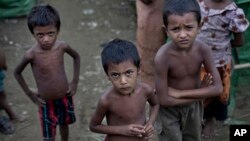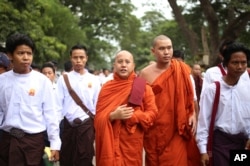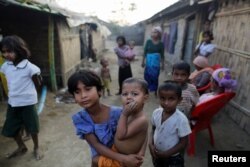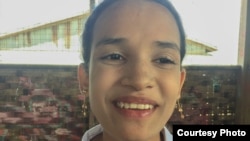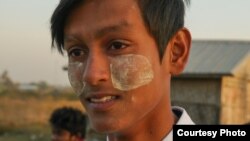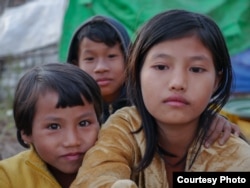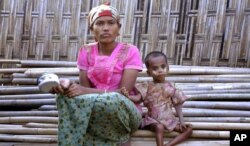The plight of displaced communities in Myanmar’s western Rakhine State and the impact of the displacement on children has led to calls, in a new film, to boost education as a vital step to end divisions between Buddhist and Muslim communities.
The documentary film, “Sittwe,” was released this month in Thailand after being banned by Myanmar censors at its original debut at a human rights film festival in Yangon.
Buddhists and Muslims affected by violence
Directed by American filmmaker Jeanne Hallacy, the film focuses on challenges faced by two 16-year-old teenagers — a Buddhist boy and a Muslim girl — who live in internally displaced camps in Rakhine state. Both their homes were torched during inter-communal violence in 2012.
That violence led to over 100,000 people forced into camps, where many, especially from the Muslim community, remain today. Muslims are prevented from returning to their former homes in Sittwe.
Hallacy says the film hopes to end tensions that remain between the Buddhist and Muslim communities.
“The film was intended to try to create a small window of discourse among youth who are living in this conflict area,” Hallacy told VOA.
“We went out of our way to make sure that we were also including Buddhist youth in it, that it wasn't just Rohingya Muslims, because Buddhist kids have also been affected,” she said. The goal, she says is to “try and create this dialogue through the film.”
The violence of 2012 devastated local communities, leading 140,000 to flee their homes into displacement camps. Others fled by boat to other parts of South East Asia seeking refuge.
Muslim youth confined to camps
The Muslim Rohingya people remain in government-controlled camps. They are not permitted to leave, even for education, and rely on informal schools within the camps.
In 2016 further bloodshed erupted after nine police officers were killed in Rakhine State by a group of Rohingya militants.
In response the Myanmar army carried out a massive crackdown, with dozens of Muslim Rohingya killed and injured, with security forces accused of human rights abuses. Thousands of Rohingya fled to neighboring Bangladesh.
Film focuses on two young people
The film followed the lives of a Buddhist boy, Aung Khan Myint, and a Muslim Rohingya girl, Phyu Phyu Than, against the background of increasing social divides.
Phyu Phyu Than hopes to become a teacher. But having completed the eighth grade at the camp school she is prevented from furthering her education at high school. Like all those living there, she is prevented from leaving.
“My ambition is to be a teacher. If Muslim students were educated maybe we wouldn't have to suffer as much,” she says.
“What I want say to Rakhine [Buddhist] girls my age is you are a human being and I am a human being. Why are you and I living so differently?” she says.
Aung Khan Myint, hopes to become a doctor and assist vulnerable children and communities. He says the community is weary of the conflict.
“Everyone is tired of the conflict. Our country is struggling. We need the majority of people to come together and support each other to live together. I want to live this way,” he says
Education may be the key
A senior Buddhist abbot, Sayadaw Bedanda Thiveinna, who blames the conflict on increasing economic stress, says a new generation of educated youth is needed to achieve long term reconciliation.
“In order to develop character people need to be educated regardless of age or gender. Then they can become aware of conflict and learn how to build peace,” the abbot says.
The film was supported by the Myanmar-based non-governmental organization, Smile Education and Development Foundation, whose executive director Myo Win says he hopes to draw the international community’s attention to the plight of education in Rakhine State.
Hallacy hopes Myanmar authorities will also be spurred to end, what she terms, “the apartheid impact upon education for Rohingya Muslim children.”
Pessimistic outlook
But progress towards community reconciliation is slow, if at all. Sai Kyaw Khiang, the cameraman for the project, says both sides living in the camps face economic and social hardships. The United Nations has been highly critical of the camps’ conditions, especially for the Rohingya community.
New York-based Human Rights Watch is pessimistic over the human rights situation in Rakhine State with deputy Asia director, Phil Robertson, calling the situation “bleak.”
Cameraman Sai Kyaw sees divisions sown by vitriol from both communities.
“It’s in the dark. I don’t see hope is coming. You have to stop a lot of problems there with the government. They — both sides — are what we call brainwashed — both sides of the community — that’s the gap,” he told VOA.
Late in July the U.N.’s special rapporteur on human rights in Myanmar, Yanghee Lee, is to make an official visit to Myanmar, including to Rakhine State.
The U.N.’s Human Rights Council had proposed a fact finding mission on rights in Myanmar, a moved opposed by the central government of Myanmar.




